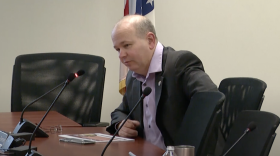Four property tax bills passed that Republican sponsors say add up to $2 billion in tax relief, with the next round of property tax bills ahead for homeowners after the start of the year. But opponents say the measures were rushed through and more could have done for struggling homeowners.
Those bills are:
- House Bill 335, which would cap the growth of increases on the funding that can be levied without a vote, known as inside millage
- House Bill 186, which would cap property tax revenue growth for districts at the guaranteed minimum funding rate known as the 20 mill floor
- House Bill 129, which would revise the formula to come up with the 20 mill floor guaranteed minimum rate
- House Bill 309, which would allow county budget commissions to reduce millage of property tax levies
"Some say that these are the most substantive changes in the last 50 years. I disagree," said Rep. Bill Roemer (R-Richfield) as he introduced one of them on the House floor. "I think these might be the most substantive changes in the last 105 years."
A last-minute Senate change to HB 186 would expand a tax credit for people who live in the homes they own. Sen. Bill Blessing (R-Colerain Twp.) said it will be revenue-neutral because a tax credit for people who own multiple homes is being rolled back, while the credit for people with a single home they occupy is being increased. Blessing said homeowners will get relief without local governments and schools shouldering the burden.
"It means $400 million per tax year of property tax relief for every homeowner in Ohio. I think that's a big deal," Blessing said on the Senate floor. "This is something that I think we can point to is actual tangible solid property tax relief that is going to be beneficial again for every homeowner."
Three Democratic senators voted against it, saying they were concerned the bills were rushed to the floor.
"We've got 610—give or take—school districts. We have 88 counties. The interplay of local value and state share is different for all of our districts," said Sen. Kent Smith (D-Euclid). "We need to give all of this interplay of public policy more time. My concern is that in this respect, between [HB] 129 and [HB] 186, the right hand doesn't know what the left hand is doing, and the taxpayers are going to end up holding the bag for all of our sloppy, hasty decisions."
HB 186 also puts in $306 million to hold schools and local governments harmless. The bill also cancels plans for an expanded sales tax holiday next year, since the money comes from the fund that would pay for that expansion.
While HB 186 got some support from Senate Democrats, all of them opposed the other three bills, and Blessing joined them in voting "no" on the other three as well. In the House, the reception for the four bills was mixed. There were Democratic votes for each of those bills in the House, with HB 129 getting the most Democratic support - 19 votes - and HB 309 getting only three Democrats on board.
House Minority Leader Dani Isaacsohn (D-Cincinnati) praised the addition of the expanded owner-occupied tax credit, but he added: "Ultimately, on property taxes, the question continues to be, is this solving the problem? That's what Ohioans need us to do to address their skyrocketing property taxes. And ultimately, this does not address that problem."
HB 129 and 309 are similar to provisions that Gov. Mike DeWine vetoed in the state budget in June. He said in his veto message that he recognized the need for property tax reform and that he'd convene a task force on the issue.
But DeWine also wrote in that veto message that giving "county budget commissions the authority to unilaterally reduce a levy passed by voters for a school district or other taxing authority under certain circumstances. This breaches the approval of such millage by the voters. Further, this item requires the Ohio Department of Taxation to calculate tax rates for certain fixed-sum levies that are currently addressed by county officials at the county level. The tax commissioner does not receive sufficient information from county auditors to calculate these rates and the timelines in this item would result in delays to taxpayers regarding their tax information for proper filing."






